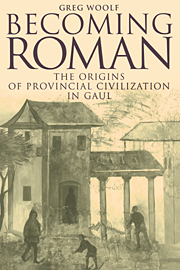Book contents
- Frontmatter
- Contents
- List of illustrations
- Preface
- Abbreviations
- Map 1 Modern regions and river names
- Map 2 Provincial boundaries c. ad 100
- Map 3 Major peoples of Roman Gaul
- 1 On Romanization
- 2 Roman power and the Gauls
- 3 The civilizing ethos
- 4 Mapping cultural change
- 5 Urbanizing the Gauls
- 6 The culture of the countryside
- 7 Consuming Rome
- 8 Keeping faith?
- 9 Being Roman in Gaul
- List of works cited
- Index
3 - The civilizing ethos
Published online by Cambridge University Press: 09 December 2009
- Frontmatter
- Contents
- List of illustrations
- Preface
- Abbreviations
- Map 1 Modern regions and river names
- Map 2 Provincial boundaries c. ad 100
- Map 3 Major peoples of Roman Gaul
- 1 On Romanization
- 2 Roman power and the Gauls
- 3 The civilizing ethos
- 4 Mapping cultural change
- 5 Urbanizing the Gauls
- 6 The culture of the countryside
- 7 Consuming Rome
- 8 Keeping faith?
- 9 Being Roman in Gaul
- List of works cited
- Index
Summary
The Gauls observed
The greater part of the Roman empire was conquered in the last generation of the free Republic and the reign of the first princeps. The rapidity of Roman expansion in that period, along with the new intensity in the encounter with Hellenism that it entailed, prompted many Romans to reconsider conventional wisdoms about their place in the world. From those reflections emerged new conceptions of Rome's past and Rome's destiny and new ideas about Roman identity, Roman virtue and Roman civilization. One of these new ideas has special relevance for this study: a growing consciousness that Romans were destined by the gods to conquer, rule and civilize the world.
Recent attempts to explain the diversity of modern colonialisms and imperialisms have led historians to examine the attitudes and ideals with which each power approached empire – among them notions of race and class, religion and sexuality, civility and nature, history and progress – and the ways in which consensuses and debates about these issues affected, and were in turn affected by, the imperial project. Unless the historian's aim is simply to condemn past imperialists by modern standards, understanding empire necessitates some consideration of these issues, perhaps even some empathetic efforts.
- Type
- Chapter
- Information
- Becoming RomanThe Origins of Provincial Civilization in Gaul, pp. 48 - 76Publisher: Cambridge University PressPrint publication year: 1998

